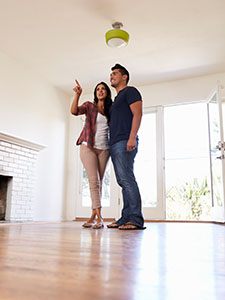POST TAGS
PurchaseBlog posted On July 21, 2021

Touring a home can be a sensory overload. Many times, we see what we want to see, and not what we need to see. In other words, when touring a home, you’re likely envisioning a perfect future instead of noticing the current imperfections of your surroundings. If you take a five-sense approach to your home tours, you can get an even better feel of how you might like your future home.
Sight
Sellers will try to ‘wow’ you with fresh paint and trendy designs, but it’s your job to see beyond the show. “The key here is to know what to look for beyond aesthetics,” says Tomas Satas, a real estate investor and home flipper in Chicago. “I always recommend my clients look for inconsistencies like paint changes, molding differences, and flooring transitions.” Check under sinks or in basements for any signs of mold, mildew, or flooding. Notice any cracks in the foundation or uneven stairs. Look for signs of possible pest problems. Anywhere you turn, try and take a closer look. “It’s the best way to find possible hidden defects that a seller may try to cover up,” says Satas. “Maybe there’s a crack in a wall that was recently filled and painted, or a water-damaged ceiling or floor.”
Sound
If you’re getting a tour from a selling agent, it’s likely they will want to talk up and highlight the benefits of the house. But if you get a chance to pull away and explore the house on your own, focus in on everything you hear. Is it quiet? Is there traffic noise? Do your neighbors have barking dogs? Often, you won’t notice little sounds when you’re taking a preliminary tour, but once you move in, you’ll probably hear it all. Listen for leaky faucets, running toilets, or scratching noises in the walls. If you can, try to come back and visit the house at different times throughout the day. “You might notice that more cars go by at rush hour, increasing the noise,” says Colleen Gerke, a real estate agent in Florida. “Are train tracks nearby with loud engines that whistle at intersections? It’s better to find these things out before you make an offer, than being startled by a train at 3 a.m. the night you move in.” Another way to get a feel for the neighborhood noise is by talking to current residents. They will be a huge asset for you in your home search. This way you can also get a feel for who you will be living near – are they welcoming? Are they trustworthy? Every little detail counts.
Smell
Your nose will be another big asset in your home search. Going through the house, you will want to take note of any scents – whether they’re moldy, smoky, or residual smells from the current owner’s pets. “Does it smell of pet urine, cigar or cigarette smoke, mold or mildew? Or does it smell like fresh paint and freshly stained floors?” asks says Betsy Ronel, a New York-based real estate agent. “Homes should smell like a sunshiney spring day — clean, not heavily scented, no strong artificial smelling air fresheners, and dust-free.” If a home is overly-sanitized or overly-bleached, that’s something else to watch out for – the owner might be trying to cover something up
Touch
If you’re touring a nice, neat home, you might be tempted to keep your hands to yourself. When it comes to investments as big as a down payment and mortgage, you want to be absolutely sure about everything you can. Open doors, check for jams, pull handles, touch any spots that might look damp from leaks. “It’s not uncommon to see water stains on ceilings or walls, especially when looking at older homes,” says Patty Matus, a real estate agent in New York. “It’s always a good idea to touch the area to see if it’s damp. If so, you know in advance of an inspection that there is an active leak.” If you can, turn on faucets or showers to check the water pressure and heat. Hold your hand over air vents to see how well your air conditioning/ heating units are working. Take off your shoes and feel the texture of the floor or carpet.
Taste
Though there aren’t many instances where you will be relying on taste during your tour, you might consider taking a sip of water from the tap. See if you will need to invest in a water filtration system – this could add more expenses to your home budget.
In a busy market, you might be tempted to make an offer without even visiting the home. But taking a virtual tour and physically visiting can give you two very different assessments of the house. So, if you can, always try to tour the home before making an offer, and if possible, visit the home more than once.
Sources: ApartmentTherapy